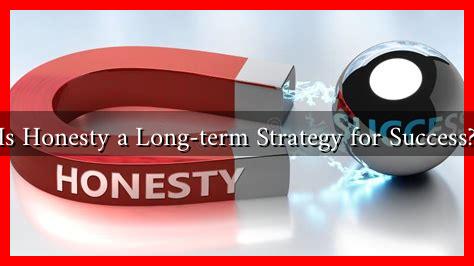-
Table of Contents
Is Honesty a Long-term Strategy for Success?
In a world where shortcuts and quick wins often dominate the conversation around success, the question arises: is honesty a viable long-term strategy for achieving success? This article delves into the importance of honesty in personal and professional realms, examining its implications, benefits, and real-world examples that illustrate its effectiveness.
The Foundation of Trust
Honesty is the cornerstone of trust, which is essential for building strong relationships—whether in business, friendships, or family. Trust fosters collaboration, loyalty, and open communication, all of which are critical for long-term success. When individuals and organizations prioritize honesty, they create an environment where stakeholders feel valued and respected.
- In Business: Companies that are transparent about their practices and values tend to cultivate a loyal customer base. For instance, Patagonia, an outdoor clothing brand, is known for its commitment to environmental sustainability and ethical practices. This honesty has not only attracted a dedicated customer base but has also positioned Patagonia as a leader in corporate responsibility.
- In Personal Relationships: Honesty in personal relationships leads to deeper connections. A study published in the journal Personality and Individual Differences found that individuals who value honesty in their relationships report higher levels of satisfaction and emotional well-being.
The Cost of Dishonesty
While dishonesty may yield short-term gains, the long-term consequences can be detrimental. Organizations and individuals who engage in deceitful practices often face severe repercussions, including loss of reputation, legal issues, and diminished trust.
- Corporate Scandals: The Enron scandal is a prime example of how dishonesty can lead to catastrophic outcomes. Once a highly regarded company, Enron’s fraudulent practices led to its bankruptcy in 2001, resulting in thousands of job losses and a significant loss of investor trust.
- Personal Consequences: On a personal level, dishonesty can lead to isolation and damaged relationships. A survey conducted by the American Psychological Association found that individuals who frequently lie report higher levels of stress and anxiety.
Honesty as a Competitive Advantage
In today’s marketplace, consumers are increasingly drawn to brands that demonstrate authenticity and integrity. A study by Harvard Business Review found that companies perceived as honest outperform their competitors in terms of customer loyalty and employee satisfaction.
- Brand Loyalty: Brands like TOMS Shoes, which operates on a one-for-one giving model, have built a loyal customer base by being transparent about their mission and practices.
- Employee Engagement: Companies that foster a culture of honesty often see higher levels of employee engagement. According to a Gallup poll, organizations with high employee engagement are 21% more profitable than those with low engagement.
Strategies for Cultivating Honesty
To harness the power of honesty as a long-term strategy for success, individuals and organizations can adopt several practices:
- Encourage Open Communication: Create an environment where team members feel safe to express their thoughts and concerns without fear of retribution.
- Lead by Example: Leaders should model honest behavior, demonstrating the value of integrity in their actions and decisions.
- Implement Transparency Policies: Organizations can benefit from clear policies that promote transparency in operations, decision-making, and communication.
Conclusion
In conclusion, honesty is not just a moral choice; it is a strategic approach that can lead to sustainable success. By fostering trust, avoiding the pitfalls of dishonesty, and leveraging honesty as a competitive advantage, individuals and organizations can build lasting relationships and achieve their goals. As the saying goes, “Honesty is the best policy,” and in the long run, it proves to be a powerful strategy for success.

